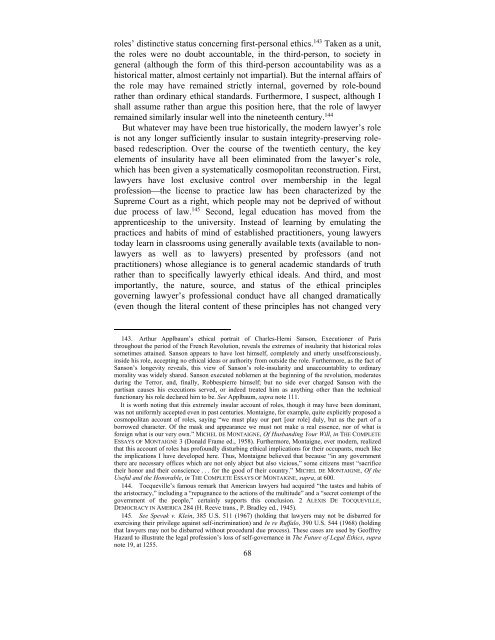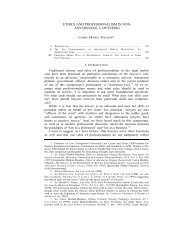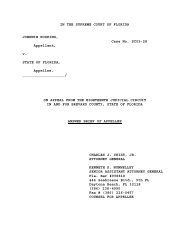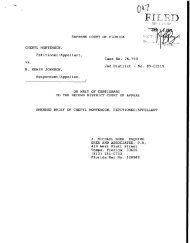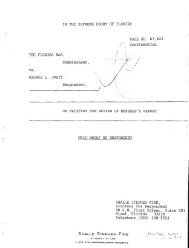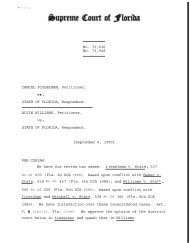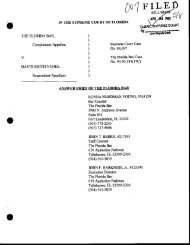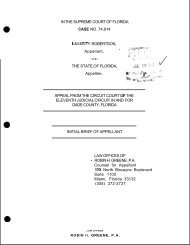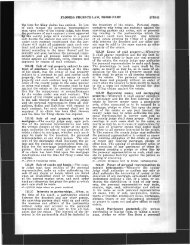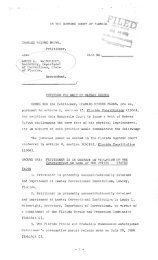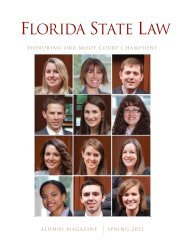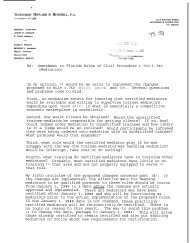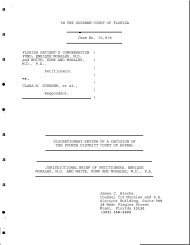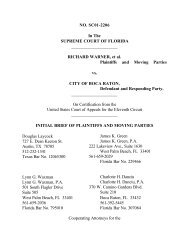The Morals and Politics of Adversary Lawyers - Florida State ...
The Morals and Politics of Adversary Lawyers - Florida State ...
The Morals and Politics of Adversary Lawyers - Florida State ...
You also want an ePaper? Increase the reach of your titles
YUMPU automatically turns print PDFs into web optimized ePapers that Google loves.
oles’ distinctive status concerning first-personal ethics. 143 Taken as a unit,<br />
the roles were no doubt accountable, in the third-person, to society in<br />
general (although the form <strong>of</strong> this third-person accountability was as a<br />
historical matter, almost certainly not impartial). But the internal affairs <strong>of</strong><br />
the role may have remained strictly internal, governed by role-bound<br />
rather than ordinary ethical st<strong>and</strong>ards. Furthermore, I suspect, although I<br />
shall assume rather than argue this position here, that the role <strong>of</strong> lawyer<br />
remained similarly insular well into the nineteenth century. 144<br />
But whatever may have been true historically, the modern lawyer’s role<br />
is not any longer sufficiently insular to sustain integrity-preserving rolebased<br />
redescription. Over the course <strong>of</strong> the twentieth century, the key<br />
elements <strong>of</strong> insularity have all been eliminated from the lawyer’s role,<br />
which has been given a systematically cosmopolitan reconstruction. First,<br />
lawyers have lost exclusive control over membership in the legal<br />
pr<strong>of</strong>ession⎯the license to practice law has been characterized by the<br />
Supreme Court as a right, which people may not be deprived <strong>of</strong> without<br />
due process <strong>of</strong> law. 145 Second, legal education has moved from the<br />
apprenticeship to the university. Instead <strong>of</strong> learning by emulating the<br />
practices <strong>and</strong> habits <strong>of</strong> mind <strong>of</strong> established practitioners, young lawyers<br />
today learn in classrooms using generally available texts (available to nonlawyers<br />
as well as to lawyers) presented by pr<strong>of</strong>essors (<strong>and</strong> not<br />
practitioners) whose allegiance is to general academic st<strong>and</strong>ards <strong>of</strong> truth<br />
rather than to specifically lawyerly ethical ideals. And third, <strong>and</strong> most<br />
importantly, the nature, source, <strong>and</strong> status <strong>of</strong> the ethical principles<br />
governing lawyer’s pr<strong>of</strong>essional conduct have all changed dramatically<br />
(even though the literal content <strong>of</strong> these principles has not changed very<br />
143. Arthur Applbaum’s ethical portrait <strong>of</strong> Charles-Herni Sanson, Executioner <strong>of</strong> Paris<br />
throughout the period <strong>of</strong> the French Revolution, reveals the extremes <strong>of</strong> insularity that historical roles<br />
sometimes attained. Sanson appears to have lost himself, completely <strong>and</strong> utterly unselfconsciously,<br />
inside his role, accepting no ethical ideas or authority from outside the role. Furthermore, as the fact <strong>of</strong><br />
Sanson’s longevity reveals, this view <strong>of</strong> Sanson’s role-insularity <strong>and</strong> unaccountablity to ordinary<br />
morality was widely shared. Sanson executed noblemen at the beginning <strong>of</strong> the revolution, moderates<br />
during the Terror, <strong>and</strong>, finally, Robbespierre himself; but no side ever charged Sanson with the<br />
partisan causes his executions served, or indeed treated him as anything other than the technical<br />
functionary his role declared him to be. See Applbaum, supra note 111.<br />
It is worth noting that this extremely insular account <strong>of</strong> roles, though it may have been dominant,<br />
was not uniformly accepted even in past centuries. Montaigne, for example, quite explicitly proposed a<br />
cosmopolitan account <strong>of</strong> roles, saying “we must play our part [our role] duly, but as the part <strong>of</strong> a<br />
borrowed character. Of the mask <strong>and</strong> appearance we must not make a real essence, nor <strong>of</strong> what is<br />
foreign what is our very own.” MICHEL DE MONTAIGNE, Of Husb<strong>and</strong>ing Your Will, in THE COMPLETE<br />
ESSAYS OF MONTAIGNE 3 (Donald Frame ed., 1958). Furthermore, Montaigne, ever modern, realized<br />
that this account <strong>of</strong> roles has pr<strong>of</strong>oundly disturbing ethical implications for their occupants, much like<br />
the implications I have developed here. Thus, Montaigne believed that because “in any government<br />
there are necessary <strong>of</strong>fices which are not only abject but also vicious,” some citizens must “sacrifice<br />
their honor <strong>and</strong> their conscience . . . for the good <strong>of</strong> their country.” MICHEL DE MONTAIGNE, Of the<br />
Useful <strong>and</strong> the Honorable, in THE COMPLETE ESSAYS OF MONTAIGNE, supra, at 600.<br />
144. Tocqueville’s famous remark that American lawyers had acquired “the tastes <strong>and</strong> habits <strong>of</strong><br />
the aristocracy,” including a “repugnance to the actions <strong>of</strong> the multitude” <strong>and</strong> a “secret contempt <strong>of</strong> the<br />
government <strong>of</strong> the people,” certainly supports this conclusion. 2 ALEXIS DE TOCQUEVILLE,<br />
DEMOCRACY IN AMERICA 284 (H. Reeve trans., P. Bradley ed., 1945).<br />
145. See Spevak v. Klein, 385 U.S. 511 (1967) (holding that lawyers may not be disbarred for<br />
exercising their privilege against self-incrimination) <strong>and</strong> In re Ruffalo, 390 U.S. 544 (1968) (holding<br />
that lawyers may not be disbarred without procedural due process). <strong>The</strong>se cases are used by Ge<strong>of</strong>frey<br />
Hazard to illustrate the legal pr<strong>of</strong>ession’s loss <strong>of</strong> self-governance in <strong>The</strong> Future <strong>of</strong> Legal Ethics, supra<br />
note 19, at 1255.<br />
68


